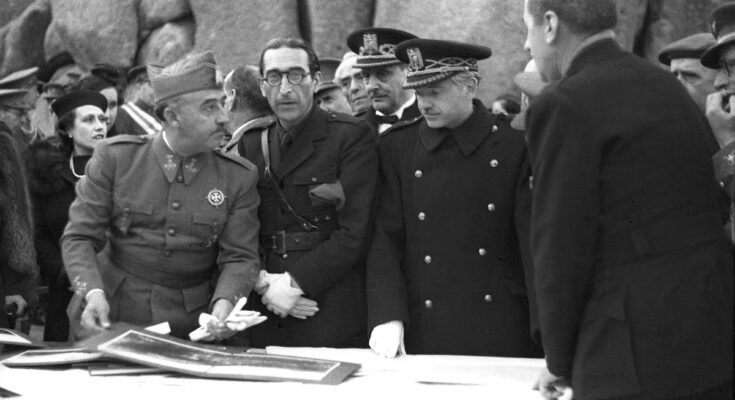The Minister of Culture, Ernest Urtasun, wanted to appear at the Congress today, Tuesday, to report “on the progress made halfway through the legislature”. To move forward, however, he invited us to look back: he announced the start of previous actions to bring about the extinction of four other Francoist foundations. On October 31, Cultura sent the “agreement for the initiation of the extinction procedure” of the organization to the Francisco Franco Foundation, a necessary preliminary step for its cancellation. After having accelerated the most symbolic procedure, the ministry is now preparing to collect information and commission a study on the organizations dedicated to the founder of the Spanish Falange José Antonio Primo de Rivera; to the politician and jurist Blas Piñar, who fought against any opening during the regime and also during the Transition; the private Ramón Serrano Suñer foundation, minister in several Francoist governments; and the Pro Infanzia (Gonzalo) Queipo de Llano Foundation, a general considered a war criminal by many historians. Two days before the fiftieth anniversary of Franco’s death and the end of his tyranny, Culture is about to erase one of its most visible legacies.
The initiative is based on the Law on Democratic Memory approved by the Government on 19 October 2022. The fifth additional provision reminds us that the fact that they “do not pursue objectives of general interest or carry out activities contrary to it” can cause the foundations to become extinct. And it establishes that “the apologia of Francoism that praises the coup d’état and the dictatorship or exalts its leaders, with contempt and humiliation of the dignity of the victims of the coup, war or Francoism, or direct or indirect incitement to hatred or violence against them because of their condition as such, is considered contrary to the general interest”. The text also provided for the possibility that the corresponding judicial body temporarily suspended the organization’s activity until the sentence was issued.
The door was thus opened to a proceeding that Cultura inaugurated against the Franco Foundation and which is now expanding to four others. The first phase consists of requesting a report from the Secretary of State for Democratic Memory, something that has already been done for the most famous organization and is starting for the others. The second part involves the opening of the procedure, with communication to the foundations involved and the deadline for complaints, where the case of the Franco Foundation is until next Monday. Finally, a report is requested from the State Attorney General, to whom Culture will have to decide “whether it is appropriate to judicially request its extinction”. The final decision rests with the judicial authorities.
“Memory prevents the past from fading and sheds light on the present. It is a transversal axis and concerns all the powers of the ministry”, underlined Urtasun before the Culture Commission. For the suppression of the Franco Foundation, his ministry had already commissioned two reports last year from the Register of Foundations and the State Secretariat for Democratic Memory (SEMD), which interviewed victims of the regime, studied the entity’s website, identified texts “dedicated to the glorification and apologia of the coup, the dictatorship and its leaders” and also examined the media coverage of the organization between January 1, 2018 and March 1 2025.
A quick look at the website of the Blas Piñar foundation allows you to find, for example, the opinion of Francoist minister José Utrera Molina about him: “He was not one of the best Spaniards of our time, but the best.” “We consider the figure of José Antonio Primo de Rivera fully valid, not as a reference for the past but for the 21st century”, we read on the organization’s page dedicated to the son of the dictator Miguel Primo de Rivera.
“A democratic government, worthy of the name, cannot allow the oblivion of everything that has happened in this country to infiltrate our collective memory and disintegrate it; a democratic government must demand, always and at all times, truth, reparation and justice, and that is what we do and will do, hand in hand with the law,” Urtasun said.
Pablo de Greiff, former United Nations special rapporteur for the promotion of truth, justice, reparation and guarantees of non-repetition and current UN commissioner for Ukraine, has always denounced that the Franco Foundation “is an anomaly in Europe”. The expert, author of a 2014 report on Spain, stressed that nothing similar exists in any EU country – much less foundations in Italy or Germany to praise Mussolini or Hitler – nor is there legislation that allows the apology of hatred.



